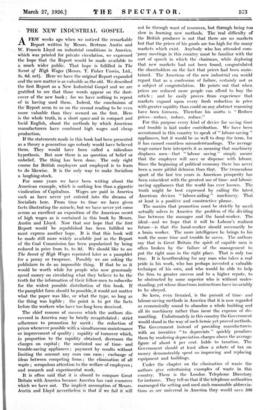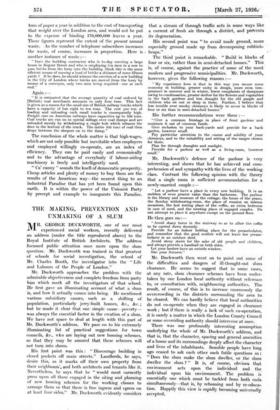A THE NEW INDUSTRIAL GOSPEL . FEW weeks ago when we
noticed the remarkable- Report written- by Messri. Bertram Austin and W. Francis Lloyd on industrial conditions in America, • • which was printed for private circulation, we expressed. the hope that the Report would be Made available to .
a much wider public. That hope is fulfilled in The Secret of High Wages (Messrs. T: Fisher Unwin, Ltd.,• 3s. 6d. net): Here'we have the original Report expanded' and the new matter is as valuable as the old. We described- the first Report as a New. Industrial Gospel and we are gratified to see that those words appear on the dust- cover of the new book ; for we have nothing to repent of in having used them. Indeed, the conclusions of the Report seem to us on the second reading to be even more valuable than they seemed on the first. Here is the whole truth, in a short space and in compact and lucid English, about the methods by which American manufacturers have combined high wages and cheap production, - If the statements made in this book had• been presented as a theory a generation ago nobody would have believed them. They would have been called a ridiculous hypothesis. But now there is no question of belief or unbelief. The thing has been done. The only -right Course for British employers and employed is to learn to do likewise. It is the only way to make Socialism a laughing-stock. - For some years we have been writing about the, American example, which is nothing less than a gigantic vindication of Capitalism. Wages are • paid in America such as have never yet entered into the dreams of Socialists here. From time - to time we have given facts illustrating the miracle, but we have never yet come across so excellent an exposition of the American secret of high wages as is contained in this book by .Messrs. Austin and -Lloyd: Now that our hope that the first Report would be republished has been fulfilled we must express another hope. It is that this book will be made still more .widely available just as the Report Of the Coal Commission has been popularized • by- being reduced in price from is. to 3d. - We should like to see The Secret of High Wages reprinted later as a pamphlet for a penny or twopence. Possibly we are asking the Publishers to do an impossible thing. If that be so it would be worth while for people who now generously spend money on circulating what they believe to be the truth for the information of their fellow-men to subscribe for the widest possible distribution of this book. If the pamphlet form should be possible, it would not matter what the paper was like, or what the type, so long as the thing was legible ; the point is .to get the facts before the workers who have too -long been deceived.
The chief reasons of success which the authors dis- covered in America may be briefly recapitulated : strict adherence to promotion by merit ; the reduction of prices whenever possible with a simultaneous maintenance or improvement of quality ; rapidity of turnover which, in proportion to the rapidity obtained, decreases the charges on capital ; the unstinted use of time- and trouble-saving appliances ; payment by results without limiting the amount any man can earn ; exchange of ideas between competing firms ;• the elimination of all waste; scrupulous attention to the welfare of employees ; and research and experimental work.
It is often said that . it is absurd to compare -Great Britain with America because .America has vast resources which we have not The iniplicit assumption of Messrs. Austin and Lloyd • nevertheless is 'that if we fail it will not be through want of resources, but through being too slow in learning neW methods. The 'real -difficulty of the British producer is not that there are no markets but that the prices of his goods are too high for the many markets which exist. Anybody who has attended com- • pang meetings in this country must be familiar with the sort of speech in which the chairman, while deploring that new markets had not been found, congratulated the shareholders on the fact that prices had been main- tained. The American of the new industrial era would regard that as a confession of failure, certainly not as a subject of congratulation. He points out that when prices are reduced more people can afford to buy the article ; and he easily proves . from experience that markets expand upon every fresh reduction in price with greater rapidity than could on any.abstract reasoning have been foreseen. Therefore his motto. is " Reduce prices=reduce, reduce, reduce." .
For this purpose every kind of device for saving time and trouble is laid under contribution. We have been accustomed in this country to speak. of " labour-saving." appliances, but it would be as well to drop the term, for it has caused countless misunderstandings. The average wage-earner here interprets it as meaning that machinery displaces menthat " labour saving " simply means that the employer will save or dispense with labour.. Since the beginning of political economy there has never, been a more pitifnl delusion than that. The tremendous spurt of the last ten years in American prosperity has been coincident with the greateSt use of time- and labonr- saving appliances that the world has eyer known. The. truth might .be best expressed by calling the latest. American devices " labour-aiding " 'machinery. That at least is a positive and constructive phrase.
The maxim that promotion must he strictly by merit actually solves in America the problem of the dividing line between the manager and the hand-worker. The ideal—and we hope that it will . be Labour's realized future—is that the hand7worker should necessarily be a brain worker. The more intelligence he brings to hiS work the more time 'and trouble he saves. . The authors say that in Great Britain the spirit of capable men is often broken by the failure of the management to put the right man in the .right place. That is only too' true. It is heartbreaking for any man who takes a real pride in his work, who has perhaps invented a valuable technique of his own, and who would be able to help the firm to greater success and to a higher repute, to be obstructed by some superior who is without under- standing, yet whose disastrous instructions have invariably to be obeyed.
So keen, even frenzied, is the pursuit of time- and labour-saving methods in America that it is now regarded as economically sound to abandon a whole building and all its machinery rather than incur the the of dis- mantling. Unfortunately in this country the Government would stand in the way of such heroic yet proved methods. The Government instead of providing manufacturers with an incentive " to depreciate_" quickly penalizes them by rendering depreciation charges above the average figure of about 8 per cent. liable . to taxation. The Government should at least allow a rebate of tax on money demonstrably spent on improving and replacing equipment and buildings.
Under the chapter on the elimination of waste the authors give entertaining examples of waste in this country. There is the London Telephone Directory for instance. They tell us that if the telephone authorities rearranged ,the setting and used, such reasonable abbrevia- tions as are universal in, America- they would save 500 tons of paper a year in addition to the cost of transporting that weight over the London area, and would not be put to the expense of binding 170,000,000 leaves a year. These figures represent the extent of the present annual waste. As the number of telephone subscribers increases the waste, of course, increases in proportion. Here is another instance of waste :— " Does the building contractor who is to-day erecting a large house in Regent Street and who is employing ten men in a row to pass bricks from the lorry into the building think this is the most efficient means of moving a load of bricks a distance of some fifteen yards ? If he does, he should witness the erection of a new building in the City of London where bricks are moved from the lorry by means of a conveyor, only two men being required—one at each end."
Again " It is estimated that the average quantity of coal ordered by [British] coal merchants amounts to only four tons. This fact is given as a reason for the small size of British railway trucks which, have a capacity of but eight to ten tons. The cost per ton of loading and unloading such small trucks is consequently high. Freight cars on American railways have capacities up to 100 tons. Coal trucks are run on to special sidings over coal dumps and are unloaded merely by withdrawing a single bolt which releases the door in the bottom of the truck. The entire 100 tons of coal then drops between the sleepers on to the dump."
The conclusion of the whole matter is that high wages, which are not only possible but inevitable when employers and employed willingly co-operate, are an index of efficiency. They can be paid easily and economically and to the advantage of everybody if labour-aiding machinery is freely and intelligently used. . " Ca' canny " sounds the knell of democratic prosperity. Cheap articles and plenty of money to buy them are the, results of the American way—the nearest thing to an industrial Paradise that has yet been found upon this.. earth. It is within the power of the Unionist Party by precept and example to inaugurate this Paradise.























































 Previous page
Previous page